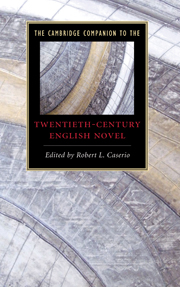Book contents
- Frontmatter
- Introduction
- 1 The art of English fiction in the twentieth century
- 2 The British Empire and the English modernist novel
- 3 Realism and rebellion in Edwardian and Georgian fiction
- 4 The Great War in English fiction
- 5 Postwar modernism in the 1920s and 1930s: The mammoth in the basement
- 6 Regionalism in English fiction between the wars
- 7 Ireland and English fiction
- 8 Feminist fiction
- 9 Working-class fiction across the century
- 10 World War II, the welfare state, and postwar “humanism”
- 11 The Windrush generation
- 12 History in fiction
- 13 Postmodernisms of English fiction
- 14 Detectives and spies
- 15 The post-consensus novel: Minority culture, multiculturalism, and transnational comparison
- 16 An absurd century: Varieties of satire
- 17 The other side of history: Fantasy, romance, horror, and science fiction
- Further reading
- Index
17 - The other side of history: Fantasy, romance, horror, and science fiction
Published online by Cambridge University Press: 28 July 2009
- Frontmatter
- Introduction
- 1 The art of English fiction in the twentieth century
- 2 The British Empire and the English modernist novel
- 3 Realism and rebellion in Edwardian and Georgian fiction
- 4 The Great War in English fiction
- 5 Postwar modernism in the 1920s and 1930s: The mammoth in the basement
- 6 Regionalism in English fiction between the wars
- 7 Ireland and English fiction
- 8 Feminist fiction
- 9 Working-class fiction across the century
- 10 World War II, the welfare state, and postwar “humanism”
- 11 The Windrush generation
- 12 History in fiction
- 13 Postmodernisms of English fiction
- 14 Detectives and spies
- 15 The post-consensus novel: Minority culture, multiculturalism, and transnational comparison
- 16 An absurd century: Varieties of satire
- 17 The other side of history: Fantasy, romance, horror, and science fiction
- Further reading
- Index
Summary
Is fantasy the dominant mode of English twentieth-century fiction? The vast popularity of J. R. R. Tolkien suggests an affirmative answer. And numerous writers can support a vision of the importance of a genre that comprehends science fiction, horror, and romance. H. G. Wells's scientific romances ushered in the twentieth century; the so-called British Boom, a blend of science fiction, horror, romance, and fantasy, ushered it out. Although fantasy and its companions certainly have escapist aspects, in a way that seems a departure from “the novel's” investments in realism and history, they powerfully address contemporary life; by opening the door to unlimited imaginative possibilities, by contemplating the other side of history - the fantastic side - they can lead to action in the real world.
The ascendency of fantasy forms would seem to be at odds with capitalist modernity, which the German sociologist Max Weber saw as havng stripped experience of all magic and wonder by the beginning of the twentieth century. However, as Fredric Jameson argues, it is the very thoroughness of capitalist rationalization of life that gives fantasy forms their staying power, fulfilling as they do longings for meaning beyond the workaday world of commodification and consumerism. Such genres “offer the possibility of sensing other historical rhythms, and of demonic or Utopian transformations of a real now unshakably set in place. ” “The great expressions of the modern fantastic, the last recognizable avatars of romance as a mode, draw their magical power from an unsentimental loyalty to those henceforth abandoned clearings across which higher and lower worlds once passed” (p. 135).
- Type
- Chapter
- Information
- The Cambridge Companion to the Twentieth-Century English Novel , pp. 251 - 266Publisher: Cambridge University PressPrint publication year: 2009
- 1
- Cited by



